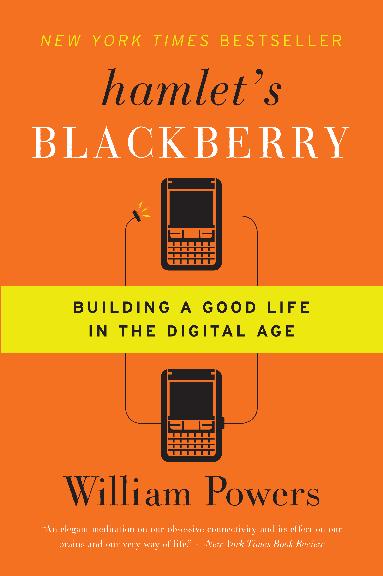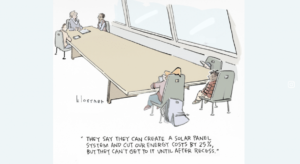Review: Hamlet’s Blackberry by William Powers

This August, William Powers released his book Hamlet’s Blackberry: Building a Good Life in the Digital Age, which seeks out the timeless philosophies of history’s greatest thinkers to delve into finding a solution to the looming question of today: Have we become too connected through technology?
I sat down on a Friday afternoon, after much of my daily tasks were cleared out of the way to begin reading Powers’ book. At a nearby coffeeshop, I had my Macbook open, my iPhone on the table and my iPad tucked into my bag. Yes, I’m what they call – a digital native.
By about page 60, I had answered countless emails, Skype messages, text messages and phone calls – all pulling me away momentarily from a book analyzing my very behavior. I, like many of us who are highly connected today, have lessons to learn from this book.
Powers begins with a brilliant visual that places the reader in a room where he or she can be tapped by everyone in the universe at all hours of the day. This room is our technological world. It’s a world, as Powers describes, that demands our attention constantly and spins us into a endless state of busyness.
Powers states that our rapid adaption to technology in the last two decades – in an effort to cut costs, expand reach, streamline management, and improve performance – has led us to two philosophies:
- “connecting via screens is good, and
- the more you connect, the better” (25, 4).
The book states that a leading research firm predicted in its study “The Hyperconnected: Here They Come!” that 40 percent of the populations in the U.S., China, India, Russia, Germany and Japan would become “hyperconnected” or fully immersed in the acquisition and use of technologies (31-32). Powers goes on to create a compelling argument that the interruptions that come with the territory of being hyperconnected have consequences.
According to studies by Basex, unnecessary interruptions, such as checking Facebook or viewing a pop-up ad, “eat up an average of 28 percent of the working day,” which can lower productivity and innovation for 15 minutes as we recover from every minute distracted (60, 62, 59). This poses a huge contradiction to the reasons that we’ve acquired technology so quickly in the past 20 years. It raises the question of the productivity of technology when there’s an abundance of it at our fingertips.
Yet, while technology and the Internet alone can present many distractions while working, these tools also allow us to connect across the globe and in more locations than ever before. The increased productivity and efficiency that technology has provided for us in our lives should not be discounted. Individuals can respond to email while at the gym, out to lunch or even on a flight across the country. Our ability to become productive has increased, leading us to busier lives. It’s when the use of these tools becomes unbalanced that it is a problem.
Powers goes on to explore the deeper troubles that technology presents. He discusses the individual relationship with the inner and outer self, our identity through technologies, and our ability to interact with one another. Through this exploration, he looks at the ways that seven philosophers including Plato, Senaca, Gutenberg, Shakespeare, Ben Franklin, Thoreau, and McLuhan thought about emerging technologies of their time and the ways to counter these excessive developments in daily life.
It’s true that the increased level of technology in our lives can be taxing. This is why it’s important to find the appropriate balance in your life to ensure that technology remains a productive and efficient tool that betters our lives. Powers concludes that we should unplug from our devices periodically by:
- Creating physical distance
- Exploring inner distance
- Simplifying to single-use tools (i.e. Disconnecting from the Internet on a computer to write a paper)
- Reverting back to older tools
- Developing healthy rituals
- Creating fun offline environments, and
- Eliminating just a few contributing factors (i.e. Getting a phone without Internet and email) (211-221).
He suggests that we do this by having “no email Fridays,” turning off our phones, walking away from our screens and disconnecting from the Internet to give ourselves a break from the rapidly connected room and tapping. Yet, the reality is that technologies that drive us to hyperconnectedness are here to stay. It’s just a matter of how best to balance our lives.
Yet, even while reading Powers’ book and having to continually resist the urge to check my email and phone, I wondered is this sort of autonomy from technologies realistic in today’s society? Can we simply reject the demands and obligations that are built around our careers, social lives and more to simply disconnect for extended periods of time?
Powers’ well-written exploration of the role of technology in our lives raises vital philosophical questions to the ways in which we spend our time, carry out our work and interact with others. However, it’s possible that we will never evolve to an era like the Jetsons; and Powers’ dialogue about technologies inhibiting the human will simply be another chapter in a book about philosophers balancing the technology of their times.
Regardless, I think Powers is right. We are all in a universal room full of constant tapping and just need a way to periodically shut off the monitor, so that our organic brains – can breathe.
Hamlet’s Blackberry was provided complimentary to Getting Smart for this blog review.







0 Comments
Leave a Comment
Your email address will not be published. All fields are required.